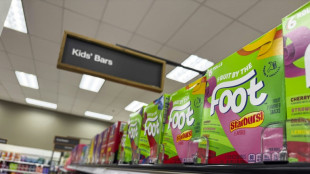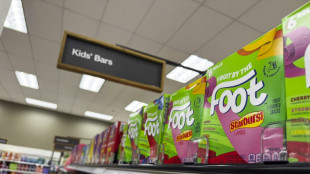
-
 Mediators announce Gaza truce, but Israel says some points 'uresolved'
Mediators announce Gaza truce, but Israel says some points 'uresolved'
-
Van Dijk laughs off talk of Liverpool wobble after more dropped points

-
 Rubio vows to confront 'dangerous' China, deter Taiwan invasion
Rubio vows to confront 'dangerous' China, deter Taiwan invasion
-
Man City's Premier League title defence is over: Foden

-
 Society centred around women in UK during Iron Age: scientists
Society centred around women in UK during Iron Age: scientists
-
UK government bans 'zombie drug' xylazine

-
 Israel, Hamas agree deal for Gaza truce, hostage release: source briefed on talks
Israel, Hamas agree deal for Gaza truce, hostage release: source briefed on talks
-
Kosovo raids Serbia-linked offices as tense elections loom

-
 Social media star Maher says rugby union must do more to grow game
Social media star Maher says rugby union must do more to grow game
-
Upping defence spending 'key point' for NATO summit: ministers

-
 Russian inflation climbs as Ukraine offensive weighs on economy
Russian inflation climbs as Ukraine offensive weighs on economy
-
South Africa's Nortje ruled out of Champions Trophy

-
 US bans controversial red food dye, decades after scientists raised alarm
US bans controversial red food dye, decades after scientists raised alarm
-
Rubio says China cheated its way to power, rejects 'liberal world order'

-
 US bank profits rise as Wall Street hopes for merger boom
US bank profits rise as Wall Street hopes for merger boom
-
Methane leaks from Nord Stream pipeline blasts revised up: studies

-
 Humanity has opened 'Pandora's box of ills,' UN chief warns
Humanity has opened 'Pandora's box of ills,' UN chief warns
-
US tightens controls on advanced chips to curb flow to China

-
 Death toll at illegal S.African mine reaches 78
Death toll at illegal S.African mine reaches 78
-
Nigeria atheist defiant after leaving jail in high-profile blasphemy case

-
 Humanity has opened 'Pandora's box of ills:' UN chief
Humanity has opened 'Pandora's box of ills:' UN chief
-
US bans red food dye over possible cancer risk: health authorities

-
 US consumer inflation rises December but underlying pressures ease
US consumer inflation rises December but underlying pressures ease
-
McIlroy and Rahm set for top-level meeting in Dubai

-
 Stock markets get boost from bank earnings, inflation data
Stock markets get boost from bank earnings, inflation data
-
TikTok plans total US shutdown as ban deadline looms: report

-
 Ghana to probe former president's huge cathedral project
Ghana to probe former president's huge cathedral project
-
Easterby sticks by Six Nations-winning veterans in first Irish squad

-
 Scotland recall Jonny Gray for Six Nations
Scotland recall Jonny Gray for Six Nations
-
UN rights chief says transitional justice 'crucial' in Syria

-
 US consumer inflation rises to 2.9 percent in December
US consumer inflation rises to 2.9 percent in December
-
Germany's Thiaw to miss Juve and Champions League clashes with hamstring injury: AC Milan

-
 France name Jegou, Auradou in Six Nations squad
France name Jegou, Auradou in Six Nations squad
-
Lategan back on top as Roma hands Ford first Dakar stage win in 10 years

-
 Mozambique's new president vows 'unity' as sworn in amid deadly protests
Mozambique's new president vows 'unity' as sworn in amid deadly protests
-
Russia PM meets Vietnam president, seeking deeper ties

-
 'New blood is coming': Mensik dumps Ruud out of Australian Open
'New blood is coming': Mensik dumps Ruud out of Australian Open
-
Syria sex abuse survivors need aid, says Nobel winner Mukwege

-
 Hammers boss Potter ready to make do and mend amid striker shortage
Hammers boss Potter ready to make do and mend amid striker shortage
-
Zverev cruises into Australian Open third round

-
 Ancelotti demands Real Madrid response after Clasico drubbing
Ancelotti demands Real Madrid response after Clasico drubbing
-
Serve better! Gauff outlines must-do for next Melbourne clash

-
 Benn and Eubank Jr boxing bout set to finally take place in London in April
Benn and Eubank Jr boxing bout set to finally take place in London in April
-
German economy shrinks again amid political crisis

-
 Spain hosted record 94 mn foreign tourists in 2024
Spain hosted record 94 mn foreign tourists in 2024
-
Thai PM says nearly fell for foreign leader phone scam

-
 European stocks climb as inflation takes centre stage
European stocks climb as inflation takes centre stage
-
Teenager Mensik sends sixth seed Ruud crashing out of Australian Open

-
 Russia strikes Ukraine energy sites in 'massive' barrage
Russia strikes Ukraine energy sites in 'massive' barrage
-
Dyche says Everton exit came at 'the right time'


US bans controversial red food dye, decades after scientists raised alarm
Outgoing US President Joe Biden's administration on Wednesday announced a ban on Red Dye No 3, a controversial food and drug coloring long known to cause cancer in animals.
Decades after scientific evidence first raised alarm, Red 3, as it is also called, is currently used in nearly 3,000 food products in the United States, according to the nonprofit Environmental Working Group.
"FDA is revoking the authorized uses in food and ingested drugs of FD&C Red No 3 in the color additive regulations," said a document from the Department of Health and Human Services, published in the Federal Register on Wednesday.
The decision stems from a petition filed in November 2022 by the Center for Science in the Public Interest (CSPI) and other advocacy groups, which cited the "Delaney Clause" -- a provision mandating the prohibition of any color additive shown to cause cancer in humans or animals.
Notably, the FDA determined as early as 1990 that Red 3 should be banned in cosmetics because of its link to thyroid cancer in male rats.
However, the additive continued to be used in foods, largely due to resistance from the food industry. Manufacturers of maraschino cherries, for example, relied on Red 3 to maintain the iconic red hue of their products.
It's also present in thousands of candies, snacks and fruit products -- and thousands of medicines, according to a search of a government-run database, DailyMed.
"Manufacturers who use FD&C Red No 3 in food and ingested drugs will have until January 15, 2027, or January 18, 2028, respectively, to reformulate their product," the FDA said.
Although the agency acknowledged a cancer link in rats, it maintained that the available evidence does not support such a link in humans, citing differences in hormonal mechanisms between the species and significantly lower exposure levels in people.
- US lags behind -
While the FDA determination focused on carcinogenicity, other research has also found potential neurobehavioral effects of synthetic food dyes on children, notably Attention-Deficit/Hyperactivity Disorder (ADHD).
"The body of evidence from human studies indicates that synthetic food dyes are associated with adverse neurobehavioral outcomes in children, and that children vary in their sensitivity to synthetic food dyes," a California government report found in 2021.
Animal studies indicated that synthetic food dyes caused changes in neurotransmitter systems in the brain and produced microscopic changes in brain structure, affecting activity, memory and learning.
The United States has been slow to act on Red 3 compared to other major economies. The European Union banned its use in 1994, with similar prohibitions enacted in Japan, China, the UK, Australia, and New Zealand.
CSPI hailed the FDA's decision as long overdue and expressed hope that it would pave the way for broader action on other harmful chemicals in food.
"They don't add any nutritional value, they don't preserve the food -- they're just there to make food look pretty," Thomas Galligan, a scientist with CSPI, told AFP.
"There's growing discussion across the political spectrum about food additives and chemicals, which reflects ongoing failures by the FDA."
The nonprofit called on the incoming administration of President-elect Donald Trump to take further steps to protect consumers, including setting stricter limits on heavy metals like lead, arsenic and cadmium, in foods consumed by children.
C.Kovalenko--BTB


